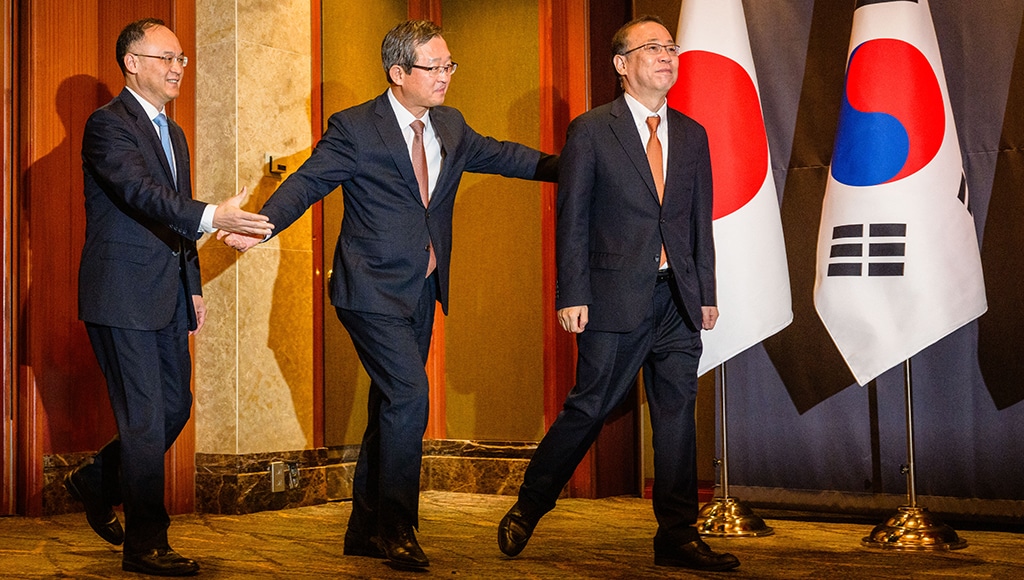BEIJING: China said on Tuesday it had agreed with Japan and South Korea to hold a summit between the three countries’ leaders “as early as possible”, after a rare meeting between senior diplomats in Seoul. The announcement comes as Seoul wraps up its first military parade in a decade showcasing its advanced arsenal in the face of plummeting ties with China’s ally North Korea. The three-way talks — attended by deputy and assistant ministers from the three countries — were seen as an attempt to ease Beijing’s concerns over Washington’s deepening security ties with Tokyo and Seoul.
Beijing described them as an “in-depth discussion on promoting the stable restarting of cooperation”. “It was agreed that carrying out cooperation between China, Japan and South Korea is in the common interests of the three parties,” foreign ministry spokesman Wang Wenbin said. The three countries agreed to hold a meeting of their foreign ministers “in the next few months”, Wang said, and to promote “the holding of a leaders’ meeting as early as possible at a time convenient to all three countries.”
South Korea’s foreign ministry also said the diplomats had “agreed to hold the trilateral summit meeting at the earliest time possible and host a trilateral ministerial meeting in preparation.” The last such summit took place in 2019. No other leaders’ summit has since been held because of diplomatic and historical disputes between Seoul and Tokyo, in part linked to Japan’s colonial rule over the Korean peninsula from 1910 to 1945.
South Korean Foreign Minister Park Jin stressed that cooperation among the three countries “plays a significant role not only in Northeast Asia but also in the peace, stability, and prosperity of the world”, his ministry said in a statement before the meeting. Park further highlighted that together, the three nations “account for 20 percent of the world’s population and 25 percent of the global GDP”, it added.
 SEOUL: (From left) China's Deputy Minister of Foreign Affairs Nong Rong, South Korean Deputy Foreign Minister Chung Byung-won and Japan's Senior Deputy Minister for Foreign Affairs Funakoshi Takehiro arrive ahead of their Trilateral High-Level Meeting (SOM).
SEOUL: (From left) China's Deputy Minister of Foreign Affairs Nong Rong, South Korean Deputy Foreign Minister Chung Byung-won and Japan's Senior Deputy Minister for Foreign Affairs Funakoshi Takehiro arrive ahead of their Trilateral High-Level Meeting (SOM).
'Provocative gesture'
Around 4,000 troops marched through central Seoul on a rain-soaked Tuesday afternoon, cheered by umbrella-bearing crowds who waved South Korean flags. They were accompanied by 170 pieces of military equipment, including air and sea drones, tanks and missiles. The number of troops and pieces of equipment taking part were revised down by officials from those originally planned. A flight display by South Korean warplanes, including US-made F-35 stealth fighters, was also cancelled because of the poor weather.
South Korean President Yoon Suk Yeol watched the parade from a platform, applauding troops as they marched past. “To demonstrate the strong foundation” of Seoul’s alliance with Washington, around 300 US military personnel also participated in the parade. The parade in Seoul “is a not-so-subtle and visually provocative gesture on the part of the South Korean government of telling (North Korean leader) Kim Jong Un that Seoul will not be backing down or looking for ways to reconcile”, LMI Consulting’s Soo Kim, a former CIA analyst, told AFP.
As the threat from nuclear-armed North Korea grows, South Korea’s President Yoon Suk Yeol has pulled Seoul closer to long-standing ally Washington. He has meanwhile sought to bury the hatchet with Japan, also a close US ally. In August they said a “new chapter” of close three-way security cooperation was beginning after a historic summit at Camp David in the United States. Beijing had lodged complaints over a statement released at the Camp David summit, in which the three allies criticized China’s “aggressive behavior” in the South China Sea.
Beijing, Seoul’s biggest trading partner, is also North Korea’s most important ally and economic benefactor. While Tokyo, Seoul and Washington have held joint military exercises against the growing North Korean threats, Beijing has recently sent senior officials to attend Pyongyang’s military parades.
China also claims self-ruled Taiwan as its territory, vowing to seize it one day, and officials in Washington — a key ally of Taipei, Seoul and Tokyo — have cited 2027 as a possible timeline for an invasion. In April, South Korea’s Yoon said that tensions over Taiwan were due to “attempts to change the status quo by force”. The comment resulted in a diplomatic tit-for-tat, with Beijing lodging a protest, which Seoul condemned as a “serious diplomatic discourtesy”. – AFP
.jpg)



